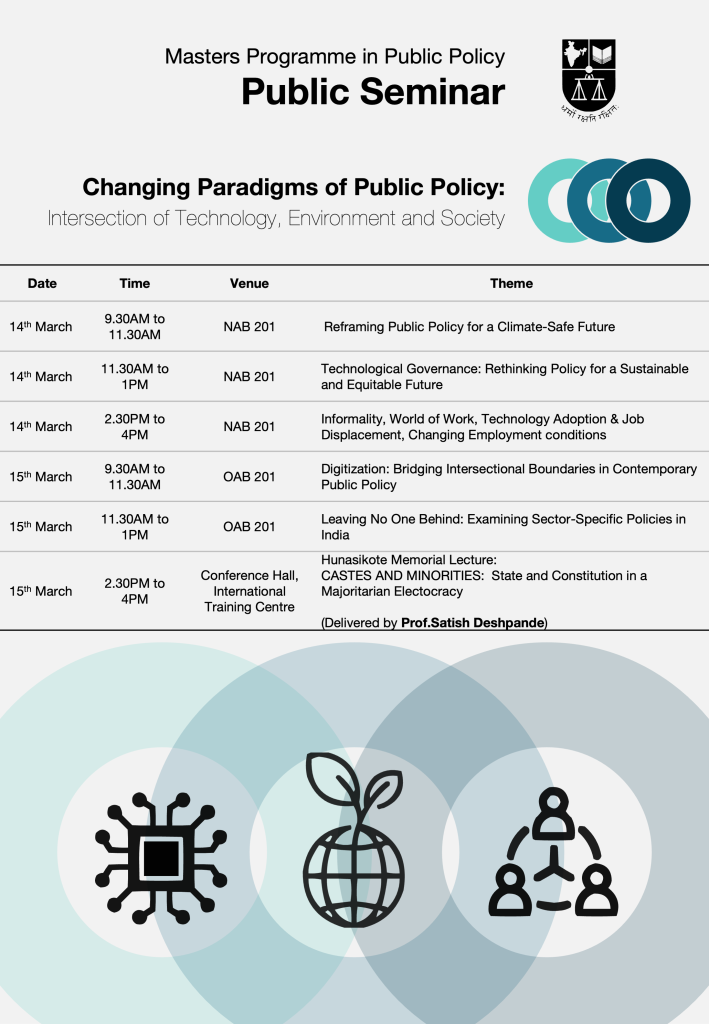Public Seminar | Changing Paradigms of Public Policy: Intersection of Technology, Environment and Society
NAB 201, OAB 201, and Conference Hall, International Training Centre, NLSIU
Thursday, March 14, 2024, 9:30 am
Two-day event
The 9th cohort of the MPP programme at NLSIU is organising a public seminar as a culmination of their course work on March 14 & 15, 2024. This two-day event will conclude with the annual Hunasikote Memorial Lecture on March 15, 2024.
About the Seminar
In contemporary forms of effective governance, policy paradigms serve as overarching frameworks that shape the discourse, decision-making processes, and outcomes for citizen and state within various sectors. Rooted in linguistic, normative, epistemic, empirical, and methodological dimensions, policy paradigms delineate meaningful problems, define data worthiness, and regulate the policy process itself (Stone, 2012). As such, they play a pivotal role in governing the trajectory of policy development and implementation, often coinciding with common sense and assuming an ideological status that makes them challenging to question (Hall,1993).
In this seminar, while we initiate a broad discussion on contemporary policy paradigms, our key concern is to develop a discussion on the evolution of policy paradigms, often influenced by myriad factors, including socio-political, economic, and cultural shifts. For instance, the transition from the personal development paradigm to the human capital paradigm in education reflects broader societal changes, such as the increasing emphasis on economic efficiency and productivity (Macpherson, 2015). This paradigmatic shift has profound implications for educational discourse and policy options, as it redefines the goals and priorities of education to align with economic imperatives (Marginson, 1993).
Therefore, through this seminar we will highlight the interconnectedness of themes within policy discourse that reflects the dynamic nature of policy paradigms. It is noteworthy that in response to paradigmatic shifts vis-a-vis shaping policy priorities and decision-making processes the themes such as economic efficiency, social justice, and equity have invariably emerged and evolved in contemporary context. Moreover, the introduction of new paradigms by cultural strangers, whether internal dissenters or external agents, have incessantly challenged existing norms and fostered policy innovation (Schmidt,2008). These outsiders bring divergent perspectives rooted in their unique cultural backgrounds, enabling a critical examination of prevailing policy paradigms and ideologies (Béland & Cox,2016).
 Schedule
Schedule
The seminar will cover the following themes across different sessions – Reframing Public Policy for a Climate-Safe Future, Technological Governance: Rethinking Policy for a Sustainable and Equitable Future, Informality, World of Work, Technology Adoption & Job Displacement, Changing Employment conditions, Digitization: Bridging Intersectional Boundaries in Contemporary Public Policy, Leaving No One Behind: Examining Sector-Specific Policies in India.
For more information on the schedule and detailed concept notes, download the brochure here.
Sri. Hunasikote Abdul Ghaffar Annual Memorial Lecture
The 4th Hunasikote Memorial Lecture on the topic “Castes and Minorities: State and Constitution in a Majoritarian Electocracy,” will be delivered by Prof. Satish Despande. This lecture will also be the concluding event of the public seminar on March 15, 2024 (2.30 pm to 4.30 pm).
About the Speaker
Prof. Deshpande currently is Prof. M.N Srinivas Chair Professor at the Institute of Social and Economic Change, Bangalore. He has worked as a Professor of Sociology in the Department of Sociology, Delhi School of Economics, University of Delhi. He has also worked at the Centre for the Study of Developing Societies and the Institute of Economic Growth (both in Delhi) and the University of Hyderabad. His research interests include caste and class inequalities, higher education today, politics and history of the social sciences, issues of language in academia and contemporary social theory. He has various national and international publications to his credit.

